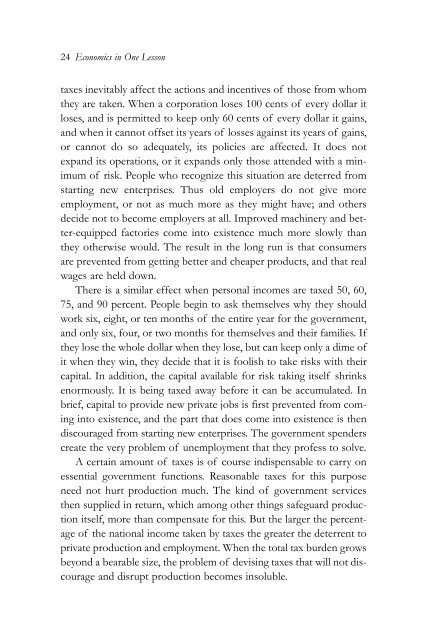1gDdM7w
1gDdM7w
1gDdM7w
- No tags were found...
Create successful ePaper yourself
Turn your PDF publications into a flip-book with our unique Google optimized e-Paper software.
24 Economics in One Lessontaxes inevitably affect the actions and incentives of those from whomthey are taken. When a corporation loses 100 cents of every dollar itloses, and is permitted to keep only 60 cents of every dollar it gains,and when it cannot offset its years of losses against its years of gains,or cannot do so adequately, its policies are affected. It does notexpand its operations, or it expands only those attended with a minimumof risk. People who recognize this situation are deterred fromstarting new enterprises. Thus old employers do not give moreemployment, or not as much more as they might have; and othersdecide not to become employers at all. Improved machinery and better-equippedfactories come into existence much more slowly thanthey otherwise would. The result in the long run is that consumersare prevented from getting better and cheaper products, and that realwages are held down.There is a similar effect when personal incomes are taxed 50, 60,75, and 90 percent. People begin to ask themselves why they shouldwork six, eight, or ten months of the entire year for the government,and only six, four, or two months for themselves and their families. Ifthey lose the whole dollar when they lose, but can keep only a dime ofit when they win, they decide that it is foolish to take risks with theircapital. In addition, the capital available for risk taking itself shrinksenormously. It is being taxed away before it can be accumulated. Inbrief, capital to provide new private jobs is first prevented from cominginto existence, and the part that does come into existence is thendiscouraged from starting new enterprises. The government spenderscreate the very problem of unemployment that they profess to solve.A certain amount of taxes is of course indispensable to carry onessential government functions. Reasonable taxes for this purposeneed not hurt production much. The kind of government servicesthen supplied in return, which among other things safeguard productionitself, more than compensate for this. But the larger the percentageof the national income taken by taxes the greater the deterrent toprivate production and employment. When the total tax burden growsbeyond a bearable size, the problem of devising taxes that will not discourageand disrupt production becomes insoluble.


